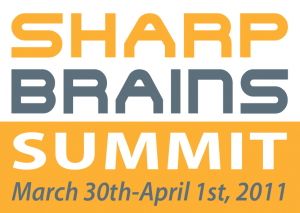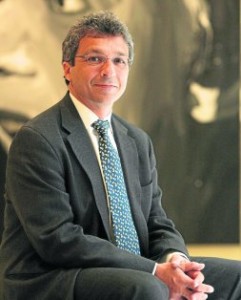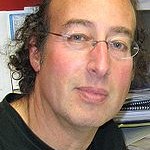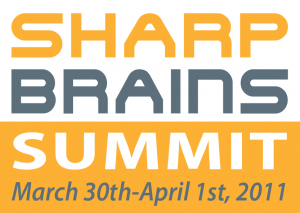New Interview Series (Part 1 of 10): Why Care About Brain Fitness Innovation?
Every Monday during the next 10 weeks we’ll discuss here what leading industry, science and policy experts –all of whom will speak at the upcoming 2011 SharpBrains Summit (March 30th — April 1st, 2011)– have to say about emerging opportunities and challenges to address, over the next 10 years, the growing brain-related societal demands.
during the next 10 weeks we’ll discuss here what leading industry, science and policy experts –all of whom will speak at the upcoming 2011 SharpBrains Summit (March 30th — April 1st, 2011)– have to say about emerging opportunities and challenges to address, over the next 10 years, the growing brain-related societal demands.
Without further ado, here you have what four Summit Speakers say…
—
 Alvaro Pascual-Leone is the Director of the Berenson-Allen Center for Non-Invasive Brain Stimulation at Harvard Medical School.
Alvaro Pascual-Leone is the Director of the Berenson-Allen Center for Non-Invasive Brain Stimulation at Harvard Medical School.
1. How would you define “brain fitness” vs. “physical fitness”?
Physical fitness can refer to an overall or general state of health and well-being. However, it is also often used more specifically to refer to the ability to perform a given activity, occupation, or sport.
Similarly brain fitness might be used to refer to a general state of healthy, optimized brain function, or a more specific brain-based ability to process certain, specific information, enable certain motor actions, or support certain cognitive abilities. Importantly though, I would argue that physical fitness REQUIRES brain fitness, while brain fitness benefits from, but does not require physical fitness.
2. Where do you see a significant opportunity for brain fitness innovation to improve the lives of a large number of people in the next decade?
A) Education; B) Access to support; C) Individually-tailored programs that can be truly deployed as therapies and can be appropriately monitored in their efficacy.
3. What is one big challenge in the way?
The establishment of a reliable screening test to assess individual brain health that might be used to optimize interventions and assess their efficacy.
4. What are your main activities in the field and where can people learn more?
Conducting research, clinical programs, developing educational programs. Our main website is: Berenson-Allen Center for Non-Invasive Brain Stimulation.
Brief bio: Dr. Pascual-Leone researches the physiology of higher cognitive functions and the study of brain plasticity in skill acquisition and recovery from injury. He is also the Program Director of the Harvard-Thorndike Clinical Research Center of the Beth Israel Deaconess Medical Center. Dr. Pascual-Leone obtained an M.D. and a Ph.D. in Neurophysiology from the Faculty of Medicine of Albert Ludwigs University in Germany, and trained at the University of Minnesota and the US National Institutes of Health. He greatly enjoys teaching and is the recipient of numerous awards.
—
 Nathanael Eisenberg is the CEO of CogniFit.
Nathanael Eisenberg is the CEO of CogniFit.
1. How would you define “brain fitness” vs. “physical fitness”?
To the extent that body fitness or physical fitness can be maintained or improved by physical exercise of motor muscles, similarly, the term brain fitness, as it is used today, mirrors that cerebral health (cognitive, emotional, biological) might be maintained or improved by exercise of different kinds, both physical AND cognitive.
2. Where do you see a significant opportunity for brain fitness innovation to improve the lives of a large number of people in the next decade?
The aging population, mental health needs and changing socio-economic realities will demand significant innovation and applications in the next decade to improve lifelong quality of life and productivity. It will be key to to make cognitive training enjoyable and fun while improving consumers’ cognitive reserve in targeted ways.
3. What is one big challenge in the way?
Changing consumers’ habits towards brain health, to make them more proactive and personally relevant.
4. What are your main activities in the field and where can people learn more?
We have initiatives and business relationships with a diverse group of partners ranging from direct to consumers offering to health provider, physicians, mental health association, driving schools and insurance companies. People can learn more at: CogniFit. Also, SharpBrains.com just published a nice article on a recent study based on one of our products to see whether Cognitive Training Can Improve Physical Fitness.
Brief bio: Mr. Eisenberg started his career in banking at Schroders before working as a financial analyst in the Trading Room of the Union Bancaire Privé. Mr. Eisenberg then worked for the IT Consulting firm Cap Gemini, and was recruited by Procter and Gamble to manage several marketing and home care initiatives. After this, Mr. Eisenberg co-founded venture fund Milk Capital, which became a major investor in CogniFit. Nathanael Eisenberg is graduated from the HEC Lausanne with a Master of Management and Business Administration.
—
 Kenneth Kosik is the Co-Director of UC Santa Barbara Neuroscience Research Institute, and Founder of Cognitive Fitness and Innovative Therapies (CFIT).
Kenneth Kosik is the Co-Director of UC Santa Barbara Neuroscience Research Institute, and Founder of Cognitive Fitness and Innovative Therapies (CFIT).
1. How would you define “brain fitness” vs. “physical fitness”?
The brain is simply an organ in the body with all the health requirements of any other organ. Therefore, I am troubled by the “versus” in your question. Why set up an unnecessary dualism? I can see the point of talking about two historical movements, but would rather discuss how they complement each other.
2. Where do you see a significant opportunity for brain fitness innovation to improve the lives of a large number of people in the next decade?
These programs could reduce the risk for Alzheimer’s disease. Rigorous studies are needed to validate this hypothesis.
3. What is one big challenge in the way?
The challenge is laying the research groundwork that will put brain fitness on a firm scientific basis.
4. What are your main activities in the field and where can people learn more?
I’d suggest checking out my recent book The Alzheimer’s Solution: How Today’s Care is Failing Millions and How We Can Do Better, and the website for CFIT.
Brief bio: Dr. Kosik received his M.D. degree from the Medical College of Pennsylvania, completed a neurology residency from Tufts New England Medical Center, and held various appointments at the Harvard Medical School. In the fall of 2004 he assumed the co-directorship of the Neuroscience Research Institute and the Harriman Chair at the University of California Santa Barbara. He has received multiple awards, including a Whitaker Health Sciences Award from Massachusetts Institute of Technology, the Derek Denny-Brown Neurological Scholar Award from the American Neurological Association, the Zenith Award from the Alzheimer’s Association, and a NASA Group Achievement Award.
—
 Ken Gibson is the President of LearningRx.
Ken Gibson is the President of LearningRx.
1. How would you define “brain fitness” vs. “physical fitness”?
If physical fitness is the “ability to function efficiently and effectively without injury, to enjoy leisure, to be healthy, to resist disease, and to cope with emergency situations” then brain fitness is the ability to mentally function efficiently and effectively at work, play, or leisure, to be sharp, to resist mental disease, and to cope with mentally demanding situations. Components of brain fitness include cognitive skills needed for fast, easy, and better learning or work performance such as: attention, working and short term memory, processing speed, logic and reasoning, and auditory and visual processing. The relative importance of each of the components varies for each task a person performs.
2. Where do you see a significant opportunity for brain fitness innovation to improve the lives of a large number of people in the next decade?
Because brain fitness doesn’t require the space and equipment of physical fitness it can become parts of many venues (insurance programs, total fitness centers – brain and physical, school and job training programs, etc). We believe a major shift will be made in
cognitive rehab – from accommodating cognitive weakness to training skills.
3. What is one big challenge in the way?
Whereas physical fitness can result in seen physical changes or functions (weight loss, larger muscles, run longer, more energy, etc) brain fitness results in harder to define results – that connection will have to be made convincingly.
4. What are your main activities in the field and where can people learn more?
We’re growing a network of physical locations (currently there are 71 LearningRx Brain Training Centers, mostly helping kids with learning difficulties), expanding online activities, and looking for independent research validation of our mostly internal trials (we have over 15,000 student records with over 20 pre/post training test results – WJ3 Cog & Ach – and over 100 Hx Dx data field – all available to researchers). Our main website is: LearningRx.
Brief bio: In 2002, Dr. Gibson founded LearningRx, a network of more than 60 centers across the United States and abroad offering cognitive skills testing and training. The company has been named to Franchise Times “Fast 55” and Franchise Marketing Magazine’s “Top 100 New Franchises,” as well as an honorable mention on the Franchise 50 list put out by Franchise Business Review.
—
 To Learn more and Register: click on 2011 SharpBrains Summit. Remember that we offer friends of SharpBrains a 15% discount using discount code: sharp2011
To Learn more and Register: click on 2011 SharpBrains Summit. Remember that we offer friends of SharpBrains a 15% discount using discount code: sharp2011


